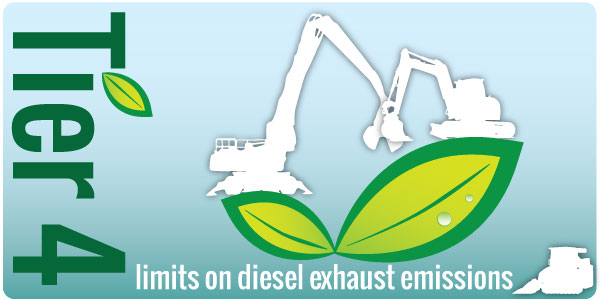
We've been running a few Tier 4 Interim and Tier 4 Final machines but mainly we have Tier 3 or older machines. It's becoming hard now after a few years of transition to Tier 4 Final to buy new skid loaders, excavators, air compressors & other construction machines with anything other than this highest level (so far) of emissions control.
I've noticed there is quite a bit of emphasis here in early 2016 by manufacturers such as JCB and Bobcat (Doosan) on the fact that their machines powered by engines under 74 HP have no DPF Diesel Particulate Filter. Why make a big deal of this? On one hand most buyers just want to buy the simplest machine possible and these announcements appeal to that. On the other hand, I wonder if less is not better.
Now it is true that the big engines in farm tractors, combines, trucks and dozers etc. have seemingly all ended up with SCR/DEF Diesels and a few more more alphabet soup devices bolted on. This stuff was all introduced on over the road trucks in 2010 and has generally worked very well. Prior to 2010 (07-09) truck and engine manufacturers did all they could to put off adding SCR and DEF to truck engines. In hindsight, and quite evident in a 2007 Volvo truck we bought, the work-arounds to stay clear of SCR and DEF were a failed experiment driven by customer push back and no mfr. wanting to buck the trend and supply before it's time a truck that had a tank for the blue DEF fluid. In the end, after being forced to add it in 2010, SCR and DEF were proven to work very well and far better than the 07-09 methods.
So reluctance to accept new but proven technology turned out to be the 'wrong battle'.
I'm not suggesting yet that you buy only diesel equipment with SCR/DEF systems, but I do believe that in engines over 74 HP it may be the best choice, even if other options are available. I say that because the engine operates closer to a natural state with SCR and DEF than it does with EGR and DPF.
A few years back the industry pundits & scribes quoted diesel engineers who expressed doubt that a final compliant diesel could be built w/o DPF and/or SCR Selective Catalytic Reduction. Even today it amazes me how many different approaches are being taken, even in the same HP range. The HP range is a factor in what the exhaust product must test at.
Now back to the 'less is better' thought. I'm convinced that Tier 3 and prior engines will outlast and outperform the newest ones simply because less emissions controls mean less engine heat, less power robbing cooling methods, and less devices to fail.
So if you can, buy good used Tier 3 machines but if you have a large fleet be sure to buy one or more machines requiring the blue DEF fluid. Why? Because it does work and allows the engine to 'breath' properly by simply using a chemical process to alter the exhaust output. Another reason for running a Tier 4 may be that a future Tier 5 regulation will make it the only way to meet standards - and you will already have some experience and comfort level.
Will Tier 4 Final without SCR/DEF work out well? I have my doubts yet and so to play it safe I'm delaying those machine purchases as long as possible while the 'bugs' get worked out, or until the machines all have blue DEF tanks on them.